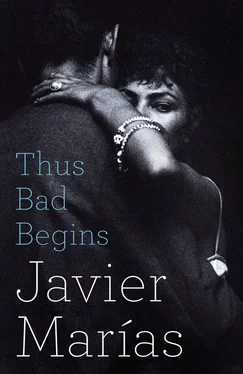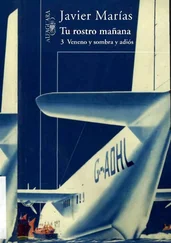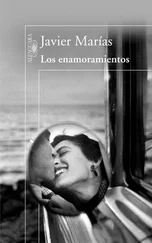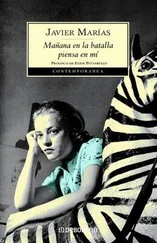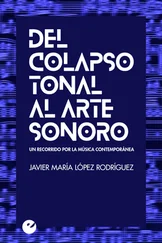Then she opened the door, revealed her presence. She wasn’t barefoot, she was wearing the high heels she almost always wore when she went out and that accentuated her voluptuous figure. When Muriel heard the door open, he got up and turned round, and when he saw her, his one eye glinted. She remained on the threshold with one hand held out, looking at him pleadingly, as if she were asking him to take her hand and lead her into the room, as if she were again calling him ‘my love’. Hearing him say that her death was the last thing he wanted, hearing him say that he would weep for her, must have seemed to her a motive for gratitude, or perhaps for unreasonable hope. However, the gesture he made was unequivocal. A gesture of rejection repeated several times, driving her away, ordering her to leave at once, as if he were scaring off a cat. I felt he was repeating the words he’d been saying to her for eight years: ‘ Non, pas de caresses . And no kisses either.’
And he did weep for her, I saw it with my own eyes. He wept for her when he heard the news and wept copiously during the burial at La Almudena cemetery, one sunny Madrid morning; I saw how the irrepressible tears flowed from his speaking eye — not from the silent one, which presumably had no tear duct or maybe the tightly fitting patch acted as a dam — while the gravediggers were finally lowering the coffin into the grave and covering it with the first spadefuls of earth. No one stayed behind to see the last spadefuls nor for the gravestone to be lowered back into place, after it had been removed to make way for the new coffin; there was still room though in the family tomb — presumably for Muriel himself; and their ill-fated son, Javier, who had been resting there for a long time and took up very little space, having died so young, would now be wrapped in his mother’s imaginary embrace. However hard Muriel found it to say goodbye, he didn’t stay behind and was so unsteady on his feet that he had to be supported, and Susana, Tomás and Alicia, who provided that support, didn’t stay behind either, more concerned about their living and temporarily aged father — a sudden ageing that lasted only a day — than about their mother who was now only abundant, inert flesh that would soon be lost, a process which, fortunately, we would not see: we, very sensibly, do not impose witnesses on the dead, but leave them in their deathly pallor to continue dying. Neither Rico nor Roy nor Van Vechten stayed behind, nor Gloria nor Marcela nor Flavia, nor Beatriz’s colleagues at the school where she used to teach her American English, nor the few students who attended as representatives, nor the two or three private students who also came. Still less Muriel’s acquaintances, who came out of obligation or out of vergüenza torera , the bullfighter’s fear of what the public will say if he holds back: maestro Rafael Viana and other gambling pals, the former accompanied by the civil servant Celia, who shot me a veiled and neutral glance; a couple of diplomats and a few people from the film industry, among whom I spotted a wine-producer whom Muriel was trying to cajole into financing his latest project and, very briefly, Jess Franco, who left almost at once, taking short, hurried steps, doubtless hoping to finish shooting half a film in what remained of the day. I was not exactly surprised to see, standing at a discreet distance, the impresaria Cecilia Alemany, who I recognized despite her dark glasses, partly because she was chewing gum, unaware of how inappropriate her mandibular movements were in that place and that context. A brazen woman, as very wealthy women tend to be, and as confirmed by her recent close relationship with my boss. I didn’t stay behind either to see the coffin disappear completely beneath the earth; it wouldn’t have been right and would have seemed strange. However, I promised myself I would visit the grave now and then, although I haven’t done so in all this time, or only once, years later, to accompany the dear departed and to support Susana, who was then the person unsteadiest on her feet.
Shortly after my conversation with Muriel, he and Beatriz, the children and Flavia went to spend the summer in a house they often stayed at in Soria, a cool, breezy town with Romanesque churches, memories of the poet Antonio Machado, a river you can swim in and a beautiful park. They had been going there for years, or else, if it got too hot there, and depending on the highs and lows of their finances, to a hotel in San Sebastián, and since Soria was less than three hours from Madrid by road, Muriel could drive back if any urgent business cropped up. I don’t know what happened during their time there, if anything did. It probably didn’t, apart from Muriel’s usual foul behaviour, possibly exacerbated by a lack of escape routes: I imagine that Muriel was only there occasionally, his presence being required urgently in Madrid or in other places, whether on genuine business or not or perhaps summoned by the first woman in many years to exercise a real hold over him. And when they came back at the end of August, I stopped working at the apartment in Calle Velázquez and said goodbye to my cubbyhole, as I had more or less decided to do anyway. I’d become too involved in everything, or perhaps that troubled marriage had got in the way of my own life, the life of a mere beginner. Another deciding factor was the invariable presence of Van Vechten, who continued coming and going as usual, although with me he was no longer friendly and chatty and relaxed, but stiff and severe. Muriel was grateful enough and fond enough not to care much about what the Doctor might have done, and after those wretched, tormenting doubts of his — which were the reason he had involved me in the whole sordid story in the first place — he preferred to know nothing about it. Van Vechten, he said, hadn’t done whatever it was to him, whereas Beatriz had. But after what Vidal had told me and after my meeting with Van Vechten in Bar Chicote, after his far-from-veiled threats (‘Be careful what you say … Do you understand me, boy?’), I didn’t even want to be in the same room as him.
This meant that I couldn’t be there to follow Beatriz or to guard or keep watch over her, to set off after her when she went out alone, which was when we should have been worried, according to her husband and as I myself discovered later on. On the other hand, I gave up that furtive and hard-to-explain habit more or less after I’d had sex with her — only on that one night and unbeknown to anyone, or known only to the someone who had run down the corridor and then said nothing or behaved no differently towards me afterwards or never looked at me reproachfully — not a sign — whoever that was, I’ve never been certain, although I have my suspicions. And even if I had been there, I wouldn’t have been able to follow her that afternoon, I never could when she got on her Harley-Davidson and disappeared off who knows where or with whom or to see whoever, if such a whoever existed. Muriel never talked to me about the two suicide attempts she had made before I came on the scene, or not in detail, but if they failed they must, like the one attempt I thwarted, have been less drastic and less rapid, less brutal and less hesitant, with a chance that she might be saved. Beatriz Noguera crashed into a tree in September, as it was getting dark, on a minor road near Ávila, a couple of kilometres from where Muriel’s brother, Roberto, had been killed, along with a young Frenchwoman, both of them in a very unbuttoned state. I don’t know why, but I imagined it would have been one of those trees — there are long rows of them — with a white line painted round them to make them more visible at night, although it may be that, by 1980, they’d stopped painting those lines, I can’t be sure, I don’t remember. Even though with motorbike or car crashes there is always the possibility that it wasn’t intended, that it happened by chance, the result of the driver’s distraction or imprudence or something quite unforeseen, we all thought that she had driven into the tree on purpose, at least we adults did. (The children, of course, were given a version involving a fallen branch, a patch of oil or an animal suddenly running out on to the road, the kinder story of cruel fate and bad luck, which Susana, wise as she was when she was fifteen, pretended to believe out of pity for her two siblings.) The crash had been so head-on that it seemed Beatriz must have chosen the tree with great care: that one and no other, even though they all look the same, perhaps thinking: ‘My guilt has passed, but the punishment remains. If not now, then when is the right time to die? I will not return to my woeful bed, I don’t want to be haunted by sorrow any more. The readiness is all.’ As I learned from Rico and Roy and Flavia and, days later, from Muriel himself, she had presumably stopped the Harley-Davidson at some point on the road and taken off her helmet, which not many people wore at the time, although she did sometimes: it was found on the grass, not on the road itself, and some metres from the site of the accident, as if it had fallen off or been thrown from that head that didn’t always feel quite right, thinking perhaps: ‘I wouldn’t want a new life with another man. I want the life I had for quite a number of years and with the same man. I don’t want to forget or get over it or move on, but to carry on in exactly the same way, like a prolongation of what was.’ Probably few cars passed at that hour, and she could have taken her time before getting up enough imaginary momentum and setting off again and accelerating to top speed, could have looked around her a little to accustom herself to that dark, leafy place, which would be her last, and perhaps, as she waited, she wondered: ‘Why should we be loved by the person we have chosen with our tremulous finger? Why that one person, as if he were obliged to obey us? Why should the person who troubles or arouses us and for whose flesh and bones we yearn, why should he desire us? Why should we believe in such coincidences? And when they do happen, why should they last? Yes, why should it last, this rarest of conjunctions, something so fragile, so held together with pins?’ She perhaps took one last look at herself and her clothes, or even took a small mirror from her handbag, now that she was about to become definitively the past, a fixed portrait; although, by then, she may not have cared at all about the state in which she would be found or seen, feeling instead very much as the poet Bécquer wrote in a letter: ‘By then, I won’t care if they place me in an Egyptian pyramid or throw me in a ditch like a dog.’ She may not even have bothered to look up at the incipient moon, all too familiar with its bored, impassive eye, she herself bored with its insistence, and may have thought: ‘Soon I will cease to belong to the foolish, unfinished living and will be like falling snow that does not settle, like a lizard climbing up a sunny wall in summer that pauses for a moment before the lazy eye that will not even notice its existence. I will be what was, and once I am no more, I will be what never was. I will be an inaudible whisper, a light, passing fever, a scratch you barely notice and that heals up at once. In short, I will be time, which no one has seen and no one ever will.’ And when at last her eyes finally grew used to the dim light, or perhaps when she started to feel cold, and she turned on the headlight again to see more clearly and not miss the tree chosen by her tremulous finger, and pressed down on the pedal to start Muriel’s bike, which ended up being more hers than his, perhaps her last thought, as she raced along, was shorter and simpler and very much like this: ‘Thus bad begins and worse remains behind.’
Читать дальше
